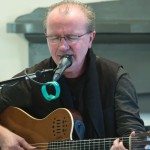Health: Coping with ADHD
Story by Dr. L. Zaiim, MD. Dr. Zaiim is a general practitioner, board-certified in pediatrics and integrative medicine. He is the medical director of Carolina Integrative Clinic in Cary, NC. Photo by Emil Zakhariev.
Cary, NC – Attention Deficit Hyperactivity Disorder, or ADHD (also called AD/HD or AD) is the most common of childhood psychiatric disorders. In this story, I will tell you what it is, who gets it and how to treat it.
About ADHD
Inattention, hyperactivity, and impulsivity are the key behaviors of ADHD starting before age seven.
The symptoms of ADHD can be difficult to define because it is hard to draw the line between normal levels of inattention, hyperactivity, and impulsivity and where clinically significant levels requiring intervention begin. To be diagnosed with ADHD, symptoms must be observed in two different settings for six months or more and to a degree that is greater than other children of the same age.
Effects 3-5% of Children
ADHD is the most commonly studied and diagnosed psychiatric disorder in children, affecting about 3 to 5 percent of children globally and diagnosed in about 2 to 16 percent of school aged children. It is a chronic disorder with 30 to 50 percent of those individuals diagnosed in childhood continuing to have symptoms into adulthood. Adolescents and adults with ADHD tend to develop coping mechanisms to compensate for some or all of their impairments. It is estimated that 4.7 percent of American adults are estimated to live with ADHD.
Diagnosed Twice As Often in Boys
ADHD is diagnosed two to four times as frequently in boys as in girls, though studies suggest this discrepancy may be partially due to subjective bias of referring teachers.
ADHD management usually involves some combination of medications, behavior modifications, lifestyle changes, and counseling. Its symptoms can be difficult to differentiate from other disorders, increasing the likelihood that the diagnosis of ADHD will be missed in some cases while in others it may be over-diagnosed.
Standard Treatment
Stimulants, such as Ritalin and Adderall, form the core of conventional treatment of ADD/ADHD. Here in the US, we now consume over 80% of the world’s stimulants.
Nonconventional Treatment
The following is a list of some research-based non-conventional treatment modalities which can be incorporated into treatment plans of patients with ADD/ADHD.
1. EEG Biofeedback (AKA Neurofeedback)
In this treatment modality children receive biofeedback training to modulate their own EEGs. The research done on this method is quite promising, but it takes many sessions and can be quite costly.
2. Vitamins/Minerals
Studies indicate a benefit to nonverbal intelligence/academics with a multivitamin and mineral supplement. This regimen should be tailored to the child.
3. Essential Fatty Acids
Eicosanoids that are produced from Essential Fatty Acids control the functioning of the pervasive prostaglandin system. These hormone-like substances mediate physiological functions throughout the body. Bottom line, the right type of fish oil can help.
Other Treatment Considerations:
- Thyroid hormone resistance: There seems to be a correlation of resistance to thyroid hormone and ADHD. If the child has a positive family history of thyroid disorder or clinical indicators, laboratory evaluation and appropriate treatment are indicated.
- Diet: I consistently recommend that parents clean up their child’s diet by reducing sugar, preservatives, dyes, and caffeine. I always recommend a high protein breakfast and more whole grains. Soda has no place for these kids. These simple changes can often make very significant modifications in behavior and attention for challenged children
- Amino Acids: Amino acid testing for determining deficiencies and correcting the deficiencies is also a useful modality. Here at CI Clinic, I collaborate with Dr. Hamid of Carolina Compounding Pharmacy & Health Center to create customized solutions for each patient.
If your child has been diagnosed with ADHD, or you suspect they may have this problem, we recommend that you research all treatment options to find what works best for you, your child and your family.
—————————————————————————–
Health News on CaryCitizen is sponsored, in part by Carolina Compounding Pharmacy of Cary.




“Here in the US, we now consume over 80% of the world’s stimulants.”
Why is ADHD a problem requiring medication only here in the US?
My pet peeve with our education system – They preach diversity, but want to medicate everyone to “normalcy”… (maybe one of my pet peeves…)
@Ian – Well that’s for darn sure. Medicate up, medicate down – and make certain everybody meets in the middle or more likely, at the same point near the bottom. It’s no longer sociably acceptable to have “good days” and “bad days”, everyone has to have the same day.
That’s the way education has gone, market it to the masses with a zero tolerance policy and make sure no kid happens to be more creative than any other kid. If he or she is, then remind the kid to color inside the lines and if they still don’t, tell the parents the kid needs a new drug.
re ADHD, some kids have it, many kids don’t and are medicated anyway. As for pot to treat it? I only know what I’ve read…
(One of many, many cites available)
http://www.nytimes.com/2009/11/22/health/22sfmedical.html?_r=1
Marijuana is the safest and most effective treatment available for ADHD and it’s sad that I have to cringe as I write this :/
Grains are toxic? I understand processing and storage can introduce mold and chemicals into food, but saying that grains are toxic seems a bit broad.
I was interested until I saw that you recommended grains, grains cause autoimmune disease and a host of other medical problems, they are toxins. Read Wheat Belly to learn more!